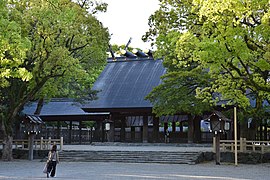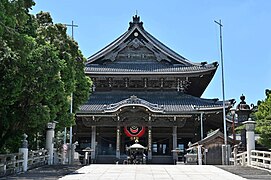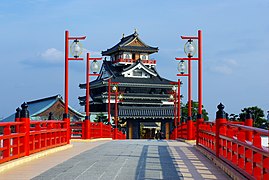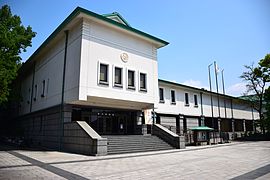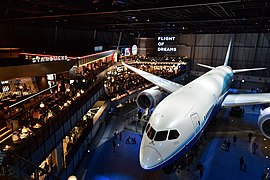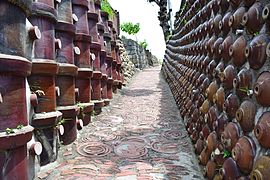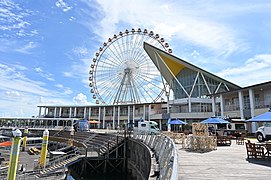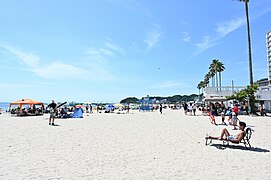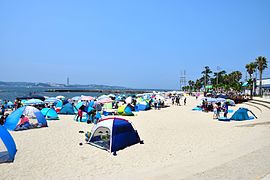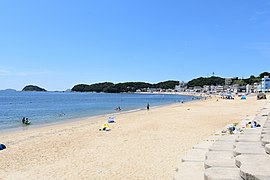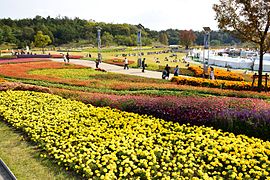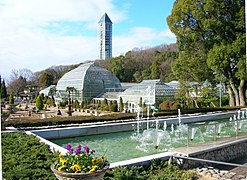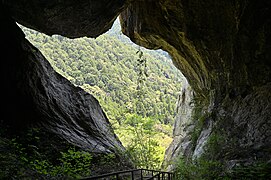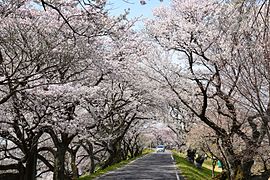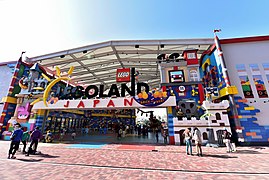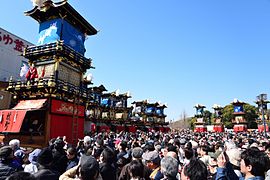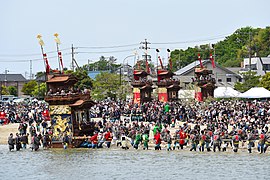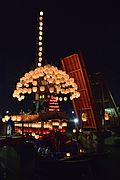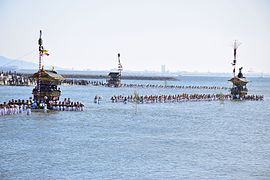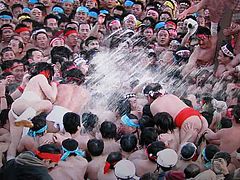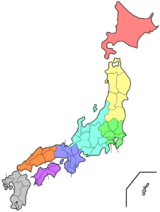Aichi
Overview
Nagoya is the capital and largest city of Aichi Prefecture, and the fourth-largest city in Japan. Other major cities include Toyota, Okazaki, and Ichinomiya. Aichi Prefecture and Nagoya form the core of the Chūkyō metropolitan area, the third-largest metropolitan area in Japan and one of the largest metropolitan areas in the world. Aichi Prefecture is located on Japan's Pacific Ocean coast and forms part of the Tōkai region, a subregion of the Chūbu region and Kansai region. Aichi Prefecture is home to the Toyota Motor Corporation. Aichi Prefecture had many locations with the Higashiyama Zoo and Botanical Gardens, The Chubu Centrair International Airport, and the Legoland Japan Resort.
Geography

Government Ordinance Designated City City Town Village


Located near the center of the Japanese main island of Honshu, Aichi Prefecture faces the Ise and Mikawa Bays to the south and borders Shizuoka Prefecture to the east, Nagano Prefecture to the northeast, Gifu Prefecture to the north, and Mie Prefecture to the west. It measures 106 km (66 mi) east to west and 94 km (58 mi) south to north and forms a major portion of the Nōbi Plain. With an area of 5,172.48 square kilometres (1,997.11 sq mi) it accounts for approximately 1.36% of the total surface area of Japan. The highest spot is Chausuyama at 1,415 m (4,642 ft) above sea level.
The western part of the prefecture is dominated by Nagoya, Japan's third largest city, and its suburbs, while the eastern part is less densely populated but still contains several major industrial centers. Due to its robust economy, for the period from October 2005 to October 2006, Aichi was the fastest growing prefecture in terms of population, beating Tokyo, at 7.4% and around with after Saitama Prefecture.
As of 1 April 2012, 23% of the total land area of the prefecture was designated as Natural Parks, namely the Aichi Kōgen, Hida-Kisogawa, Mikawa Wan, and Tenryū-Okumikawa Quasi-National Parks along with seven Prefectural Natural Parks.
Cities
Thirty-eight cities are located in Aichi Prefecture.
Towns and villages
These are the towns and villages in each district:
Demographics

| Year | Pop. | ±% p.a. |
|---|---|---|
| 1890 | 1,473,099 | — |
| 1903 | 1,752,042 | +1.34% |
| 1913 | 2,073,224 | +1.70% |
| 1920 | 2,089,762 | +0.11% |
| 1925 | 2,319,494 | +2.11% |
| 1930 | 2,567,413 | +2.05% |
| 1935 | 2,862,701 | +2.20% |
| 1940 | 3,166,592 | +2.04% |
| 1945 | 2,857,851 | −2.03% |
| 1950 | 3,390,585 | +3.48% |
| 1955 | 3,769,209 | +2.14% |
| 1960 | 4,206,313 | +2.22% |
| 1965 | 4,798,653 | +2.67% |
| 1970 | 5,386,163 | +2.34% |
| 1975 | 5,923,569 | +1.92% |
| 1980 | 6,221,638 | +0.99% |
| 1985 | 6,455,172 | +0.74% |
| 1990 | 6,690,603 | +0.72% |
| 1995 | 6,868,336 | +0.53% |
| 2000 | 7,043,300 | +0.50% |
| 2005 | 7,254,704 | +0.59% |
| 2010 | 7,410,719 | +0.43% |
| 2015 | 7,484,094 | +0.20% |
| Source: Statistics Bureau, Ministry of Internal Affairs and Communications | ||
As of 2001, Aichi Prefecture's population was 50.03% male and 49.97% female. 139,540 residents (nearly 2% of the population) are of foreign nationality.
Population by age (2001)
| Age | % population | % male | % female |
|---|---|---|---|
| 0–9 | 10.21 | 10.45 | 9.96 |
| 10–19 | 10.75 | 11.02 | 10.48 |
| 20–29 | 15.23 | 15.71 | 14.75 |
| 30–39 | 14.81 | 15.31 | 14.30 |
| 40–49 | 12.21 | 12.41 | 12.01 |
| 50–59 | 15.22 | 15.31 | 15.12 |
| 60–69 | 11.31 | 11.22 | 11.41 |
| 70–79 | 6.76 | 6.01 | 7.52 |
| Over 80 | 3.12 | 2.01 | 4.23 |
| Unknown | 0.38 | 0.54 | 0.23 |
Mergers
History
Originally, the region was divided into two provinces of Owari and Mikawa. After the Meiji Restoration, Owari and Mikawa were united into a single entity. In 1871, after the abolition of the han system, Owari, with the exception of the Chita Peninsula, was established as Nagoya Prefecture, while Mikawa combined with the Chita Peninsula and formed Nukata Prefecture. Nagoya Prefecture was renamed to Aichi Prefecture in April 1872 and was united with Nukata Prefecture on November 27 of the same year.
The government of Aichi Prefecture is located in the Aichi Prefectural Government Office in Nagoya, which is the old capital of Owari. The Aichi Prefectural Police and its predecessor organisations have been responsible for law enforcement in the prefecture since 1871.
The Expo 2005 World Exposition was held in Seto and Nagakute.
Etymology
In the third volume of the Man'yōshū there is a poem by Takechi Kurohito that reads: "The cry of the crane, calling to Sakurada; it sounds like the tide, draining from Ayuchi flats, hearing the crane cry". Ayuchi is the original form of the name Aichi, and the Fujimae tidal flat is all that remains of the earlier Ayuchi-gata. It is now a protected area.
For a time, an Aichi Station existed on the Kansai Line (at the time the Kansai Railway) between Nagoya and Hatta stations, but its role was overtaken by Sasashima-raibu Station on the Aonami Line and Komeno Station on the Kintetsu Nagoya Line.
Economy
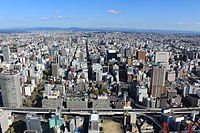
Gross domestic product (2018) is the second largest in Japan, the shipment value of manufactured goods (2018) is the first in Japan, annual product sales (2019) is the third largest in Japan, and its agricultural output (2018) is eighth in Japan. Aichi's agriculture industry and commerce are all ranked high in Japan, and the industrial structure is well-balanced.
- Main industry
Companies headquartered in Aichi include the following.
| Aichi Steel | Tōkai |
| Aisin Seiki | Kariya |
| Brother Industries, Ltd. | Nagoya |
| Central Japan Railway Company | Nagoya |
| Denso Corporation | Kariya |
| Eisaku Noro Company | Ichinomiya |
| Kanesue Corporation | Ichinomiya |
| Makita Corporation | Anjō |
| Matsuzakaya | Nagoya |
| Mizkan Corporation | Handa |
| Nagoya Railroad | Nagoya |
| Nippon Sharyo | Nagoya |
| Noritake | Nagoya |
| Okuma Corporation | Ōguchi |
| Sumitomo Riko | Komaki |
| Toyota Motor Corporation | Toyota |
Companies such as Fuji Heavy Industries, Mitsubishi Motors, Pfizer, Sony, Suzuki, Bodycote, and Volkswagen Group also operate plants or branch offices in Aichi.
International relations

Sister regions
 Victoria, Australia – May 2, 1980
Victoria, Australia – May 2, 1980 Jiangsu, China – July 28, 1980
Jiangsu, China – July 28, 1980 Bangkok, Thailand – July 9, 2012
Bangkok, Thailand – July 9, 2012 Guangdong, China – November 25, 2013
Guangdong, China – November 25, 2013 Gyeonggi Province, South Korea – November 10, 2015
Gyeonggi Province, South Korea – November 10, 2015 Texas, United States – April 22, 2016
Texas, United States – April 22, 2016 Ho Chi Minh City, Vietnam – September 13, 2016
Ho Chi Minh City, Vietnam – September 13, 2016 Washington, United States – October 18, 2016
Washington, United States – October 18, 2016 Brussels, Flemish Region, Wallonia, Belgium – May 15, 2017
Brussels, Flemish Region, Wallonia, Belgium – May 15, 2017 Indiana, United States – September 15, 2017
Indiana, United States – September 15, 2017 Kentucky, United States – October 23, 2017
Kentucky, United States – October 23, 2017 Occitanie, France – June 5, 2018
Occitanie, France – June 5, 2018 São Paulo, Brazil – September 10, 2018
São Paulo, Brazil – September 10, 2018
Transport
Rail








 JR Central
JR Central Tokaido Shinkansen
Tokaido Shinkansen- ■Tokaido Line
- ■Chūō Main Line
- ■Kansai Line
- ■Taketoyo Line
- ■Iida Line
 Meitetsu
Meitetsu- NH Nagoya Line
- IY Inuyama Line
- KM Komaki Line
- TA Centrair Line
- TA Tokoname Line
- ST Seto Line
- TK Toyokawa Line
- GN Gamagori Line
- TT Toyota Line
- KC Chita Line
- MU MY Mikawa Line
- TB Bisai Line
- CH Chikko Line
- TB Tsushima Line
 Kintetsu
Kintetsu- E Nagoya Line
 Aonami Line
Aonami Line Nagoya Municipal Subway
Nagoya Municipal Subway Higashiyama Line
Higashiyama Line Meijo Line
Meijo Line Tsurumai Line (connecting to Meitetsu Toyota and Inuyama Line)
Tsurumai Line (connecting to Meitetsu Toyota and Inuyama Line) Sakura-dori Line
Sakura-dori Line Meiko Line
Meiko Line Kamiiida Line (connecting to Meitetsu Komaki Line)
Kamiiida Line (connecting to Meitetsu Komaki Line) Toyohashi Railroad
Toyohashi Railroad Aichi Loop Line
Aichi Loop Line
People movers and tramways
- Linimo
- Nagoya Guideway Bus
- Toyohashi Railroad
Road
Expressways and toll roads
- Chita across Road
- Chita Peninsula Road
- Chubu International Airport Connecting Road
- Chuo Expressway
- Higashi-Meihan Expressway (East Meihan Expressway)
- Isewangan Expressway (Ise Bayside Expressway)
- Meishin Expressway
- Mei-Nikan Expressway
- Nagoya Expressway
- Nagoya Seto Road
- Shin-Meishin Expressway
- Shin-Tōmei Expressway
- South Chita Road
- Tokai-Hokuriku Expressway
- Tomei Expressway
National highways
- Route 1
- Route 19 (Nagoya-Kasugai-Tajimi-Nagiso-Matsumoto-Nagano)
- Route 22 (Nagoya-Ichinomiya-Gifu)
- Route 23 (Ise-Matsuzaka-Suzuka-Yokkaichi-Nagoya-Toyoake-Chiryu-Gamagori-Toyohashi)
- Route 41 (Nagoya-Komaki-Inuyama-Gero-Takayama-Toyama)
- Route 42
- Route 151
- Route 153
- Route 154
- Route 155 (Tokoname-Chita-Kariya-Toyota-Seto-Kasugai-Komaki-Ichinomiya-Tsushima-Yatomi)
- Route 247
- Route 248
- Route 257 (Hamamatsu-Shinshiro-Toyota-Ena-Nakatsugawa-Gero-Takayama)
- Route 259
- Route 301
- Route 302
- Route 362
- Route 363
- Route 366
- Route 419
- Route 420
- Route 473 (Gamagori-Okazaki-Toyota-Shitara-Hamamatsu)
- Route 474
- Route 475
Airports
Ports
- Kinuura Port – Handa and Hekinan
- Mikawa Port – mainly automobile and car parts export and part of inport base
- Nagoya Port – International Container hub and ferry route to Sendai and Tomakomai, Hokkaido
Education
Universities
National universities
- Aichi University of Education
- Graduate University for Advanced Studies - Okazaki Campus (National Institute for Basic Biology, Japan, National Institute for Physiological Sciences, Japan)
- Nagoya Institute of Technology
- Nagoya University
- Toyohashi University of Technology
Public universities
Private universities
- Aichi Bunkyo University
- Aichi Gakuin University
- Aichi Gakusen University
- Aichi Institute of Technology
- Aichi Medical University
- Aichi Mizuho College
- Aichi Sangyo University
- Aichi Shukutoku University
- Aichi Toho University
- Aichi University
- Aichi University of Technology
- Chubu University
- Chukyo University
- Daido University
- Doho University
- Fujita Health University
- Globis University Graduate School of Management – Nagoya Campus
- Japanese Red Cross Toyota College of Nursing
- Kinjo Gakuin University
- Meijo University
- Nagoya Bunri University
- Nagoya College of Music
- Nagoya Gakuin University
- Nagoya Keizai University
- Nagoya Sangyo University
- Nagoya University of Arts
- Nagoya University of Arts and Sciences
- Nagoya University of Commerce & Business
- Nagoya University of Foreign Studies
- Nagoya Women's University
- Nagoya Zokei University
- Nanzan University
- Nihon Fukushi University
- Ohkagakuen University
- Okazaki Women's Junior College
- Seijoh University
- Seisa University – Nagoya Schooling Campus
- Shigakkan University
- Shubun University
- Sugiyama Jogakuen University
- Tokai Gakuen University
- Tokyo University of Social Welfare – Nagoya Campus
- Toyohashi Sozo College
- Toyota Technological Institute
- University of Human Environments
Senior high schools
This section needs expansion. You can help by adding to it. (October 2015) |
Sports
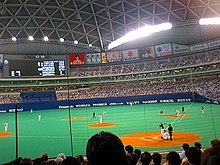
(NagoyaHigashi-ku)

(Toyota)

(Kariya)

(NagoyaMinato-ku)

(NagoyaMizuho-ku)
The sports teams listed below are based in Aichi.
Baseball
Soccer
- Nagoya Grampus (Nagoya and Toyota)
- Tokai Regional League
Basketball
- Aisin AW Areions Anjo (Anjō)
- Nagoya Diamond Dolphins (Nagoya)
- SAN-EN NeoPhoenix (Toyohashi and Hamamatsu)
- SeaHorses Mikawa (Kariya)
- Toyotsu Fighting Eagles Nagoya (Nagoya)
Volleyball
- Denso Airybees (Nishio)
- JTEKT Stings (Kariya)
- Toyoda Gosei Trefuerza (Inazawa)
- Toyota Auto Body Queenseis (Kariya)
Rugby
Futsal
Football
- Aichi Golden Wings (Nagoya and Toyota)
- Kirix Toyota Bull Fighters (Toyota)
- Nagoya Cyclones (Nagoya)
- AFL
Tourism


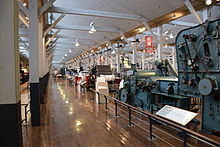




Notable sites in Aichi include the Meiji Mura open-air architectural museum in Inuyama, which preserves historic buildings from Japan's Meiji and Taishō periods, including the reconstructed lobby of Frank Lloyd Wright's old Imperial Hotel (which originally stood in Tokyo from 1923 to 1967).
Other popular sites in Aichi include the tour of Toyota car factory in the city by the same name, the monkey park in Inuyama, and the castles in Nagoya, Okazaki, Toyohashi, and Inuyama.
Aichi Prefecture has many wonderful beaches. For example, Himakajima Beach, Shinojima Beach, Akabane Beach and Utsumi Beach.
-
Kiyosu Castle and Kiyosu Castle Park in Kiyosu
-
Tokoname pottery footpath
-
Utsumi Beach(Chidorigahama)
-
Sakushima
-
Nishiura Onsen
-
Site of Expo 2005
-
Field Mustard, Tahara
-
Mount Hōraiji
-
Obara shikizakura
-
Chausuyama Plateau
-
Katahara Onsen(Hydrangea Park)
-
The ruins of Matsudaira
-
Sakurabuchi Park
-
Thousand Rice Paddies of Yotsuya
-
Kisogawazutsumi
-
View of Cape Irago from Irago Ocean Resort
Notable people from Aichi
This section needs expansion. You can help by adding to it. (June 2021) |
- F Chopper Koga (Japanese: FチョッパーKOGA, romanized: Efu Choppā Koga), bass player and leader of the rock band Gacharic Spin
- Yūki Ishikawa (石川祐希), professional volleyball player, Japan National Team, Power Volley Milano Italy Super Lega
- Takahiro Sakurai (born 1974), Japanese actor, narrator and radio personality
- Syoh Yoshida (born 1984), Japanese artist
- Yuki Yamada (actor) (born 1990), Japanese actor
- Yoshiaki Katayama (born 1993), racing driver
- Tatsuya Kataoka (born 1975), racing driver
- Haruna Ono (musician), lead vocals and rhythm guitarist for the rock band Scandal
- Mami Sasazaki (musician), lead guitar and vocalist for the rock band Scandal
- Suzuki Ichiro, professional baseball player, member of Japan national baseball team and 2x time World Baseball Classic Champion
- Koji Kondo (born 1961), composer and pianist born in Nagoya who works on video game soundtracks for Nintendo
- Kazuchika Okada (born 1987), professional wrestler from Anjō
- Akira Toriyama (1955–2024), manga artist and character designer from Kiyosu
- Aoi Morikawa (born 1995), actress and model
- Sato Keigo (born 1998), singer, member of JO1
- Kimata Syoya (born 2000), singer, member of JO1
- Kimura Masaya (born 1997), singer, dancer, member of INI (Japanese boy group)
- Sakurai Miu (born 2002), singer, member of Me:I
- Kato Cocoro (born 2000), singer, member of Me:I
- Maria Makino, idol singer and member of Morning Musume
Festival and events
- UNESCO Intangible Cultural Heritage
- Owari Tsushima Tenno Matsuri (Aisai, Tsushima)
- Inuyama Festival (Inuyama)
- Kamezaki Shiohi Festival (Handa)
- Chiryu Festival (Chiryū)
- Sunari Festival (Ama District Kanie)
-
Owari Tsushima Tennōsai (eve)
-
Inuyama Festival
-
Kamezaki Shiohi Festival
-
Chiryu Festival
-
Sunari Festival
- Others
- Nagoya Festival (Nagoya City)
- Tsutsui-chō/Dekimachi Tennō Festival (Nagoya Higashi-ku)
- Miya Festival (Gamagōri)
- Toyohama Sea bream Festival (Chita District Minamichita Town)
- Okkawa Festival (Handa)
- Hōnen Matsuri (Komaki)
- Omanto festival (Takahama)
- Kōnomiya Hadaka Matsuri (Inazawa)
- Tezutsu Matsuri (Toyohashi, Toyokawa)
- Nagashino festival (Shinshiro)
- Mando festival (Kariya)
- Isshiki Lantern Festival (Nishio)
- Toba Fire Festival (Nishio)
- Owari Tsushima Autumn Festival (Tsushima)
-
Nagoya Festival
-
Tsutsui-chō/Dekimachi Tennō Festival
-
Miya Festival
-
Toyohama Sea bream Festival
-
Okkawa Festival
-
Omanto festival
-
Kōnomiya Hadaka Matsuri
-
Toyokawa Tezutsu Matsuri
-
Nagashino festival
-
Mando festival
-
Isshiki Lantern Festival
-
Toba Fire Festival
-
Owari Tsushima Autumn Festival
References
- ^ "2020年度国民経済計算(2015年基準・2008SNA) : 経済社会総合研究所 - 内閣府". 内閣府ホームページ (in Japanese). Archived from the original on 2023-09-24. Retrieved 2023-05-18.
- ^ Frédéric, Louis (31 May 2002). Japan Encyclopedia. Translated by Roth, Käthe. Harvard University Press. ISBN 978-0674007703. OCLC 58053128. OL 7671330M.
- ^ "General overview of area figured for Natural Parks by prefecture" (PDF). Government of Japan. Ministry of the Environment. 1 April 2014. Archived (PDF) from the original on 5 November 2020. Retrieved 11 November 2020.
- ^ "Statistics Bureau Home Page". Ministry of Internal Affairs and Communications. Statistics Bureau. n.d. Archived from the original on 8 November 2020. Retrieved 12 November 2020.
- ^ "Summary of Aichi Prefecture". Aichi Prefectural Government Official Site. Aichi Prefectural Government Office. n.d. Archived from the original on 29 October 2020. Retrieved 11 November 2020.
- ^ Sadamichi, Kato (1 July 2000). "Rediscovering an Ancient Poem to Save a Tidal Flat". International Studies in Literature and Environment. 7 (2). Oxford University Press: 189–197. doi:10.1093/isle/7.2.189. eISSN 1759-1090. ISSN 1076-0962. OCLC 819414712.
- ^ "Business Locations". Sumitomo Riko. Archived from the original on 12 November 2020. Retrieved 11 November 2020.
- ^ Yoon, John; Notoya, Kiuko (8 March 2024). "Akira Toriyama, Creator of 'Dragon Ball,' Dies at 68". The New York Times. Archived from the original on 9 March 2024. Retrieved 21 March 2024.
- ^ "STモデル プロフィール:森川 葵(もりかわ あおい)Aoi Morikawa|Seventeen(セブンティーン)". Seventeen On Line (in Japanese). Archived from the original on 29 March 2015. Retrieved 19 June 2015.
- ^ "Yama, Hoko, Yatai, float festivals in Japan". Website of the Convention for the Safeguarding of the Intangible Cultural Heritage. UNESCO. Secretariat of the Convention for the Safeguarding of the Intangible Cultural Heritage. n.d. Archived from the original on 10 July 2020. Retrieved 12 November 2020.
External links
 Aichi travel guide from Wikivoyage
Aichi travel guide from Wikivoyage- Official website
- Aichi Now-Official Site for Tourism Aichi
- Aichi, HOME of the Samurai Spirit Archived 2013-11-27 at the Wayback Machine




























